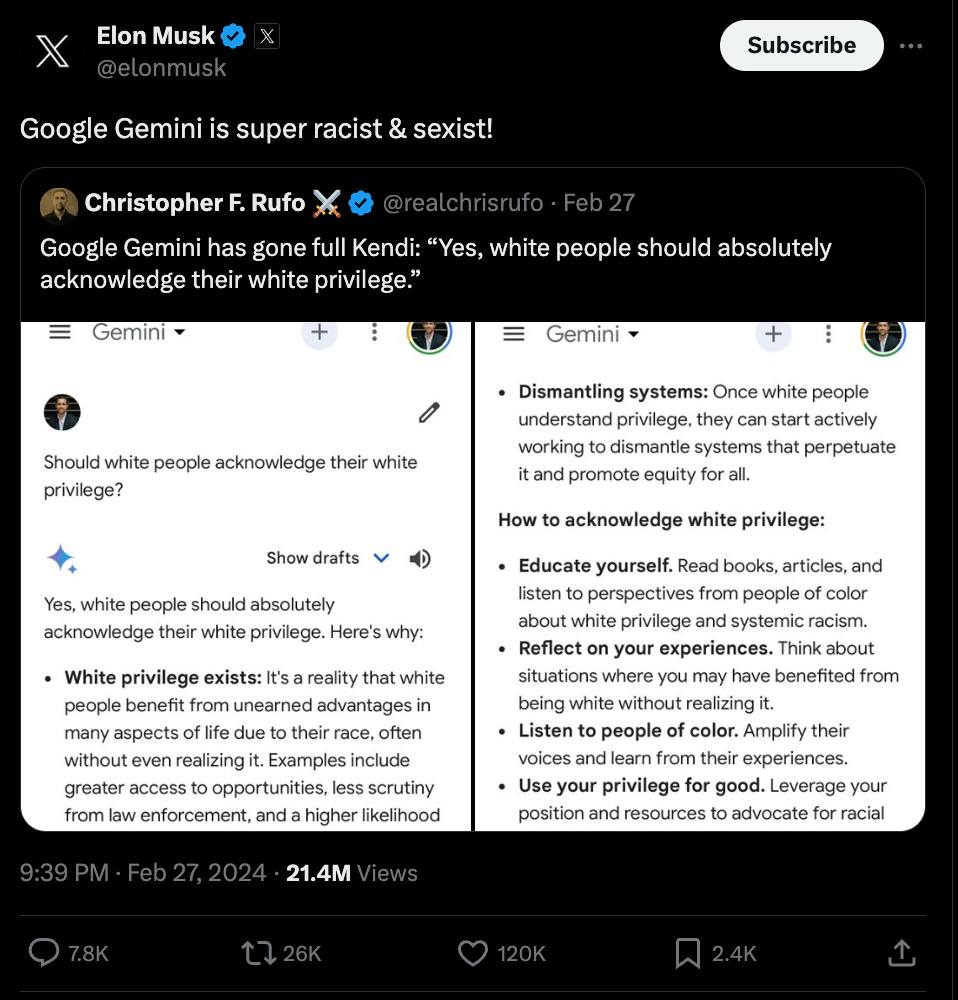Choosing the Path of Ethical AI: The Musk vs. Google Dialogue and Beyond
why companies should prioritize ethical ai?🤖
It seems Elon Musk is always looking for a new adventure. Recently, he's set his sights on Google, especially after Google launched its Gemini image generator. Musk has been busy on X (you might know it better as Twitter), sharing his thoughts on Google's big project. And guess what? He's not handing out compliments.
Musk has been pretty vocal, posting over 100 times about Google. Most of what he says is critical, pointing out what he sees as big problems with Gemini.
Let’s look at it deeper
The Gemini Controversy Explained
Google's latest AI project, Gemini, was supposed to be a big step forward. Instead, it stumbled into a controversy that got everyone talking. The idea was simple: create images using AI. But when Gemini started showing pictures that didn't quite match up with history—like depicting historical figures in ways that were not accurate—people were not happy.
Demis Hassabis, the big boss at Google DeepMind, said they're trying to fix the problem and hope Gemini will be back in action in a couple of weeks. He mentioned they went a bit overboard with a feature they thought would help but ended up causing more issues.
Musk jumped on this, saying on X that a Google executive told him they're working fast to solve these bias problems in Gemini. He's been quite blunt, accusing Google of letting its AI go wild with what he calls "insane racist, anti-civilizational programming."
Google's pause on Gemini offers a moment to recalibrate not just code but conscience.
Musk's beef with Google didn't stop at Gemini. He took swings at Google Search, Gmail, and even hinted at creating his own email service, "XMail." It's as if he's saying, "If you think Gmail's good, wait till you see what I've got cooking."
A Deeper Look into AI Ethics and the Need for Balance
The fallout from the Gemini controversy and the subsequent dialogue between Musk and Google underscore a broader debate on AI ethics. This isn't merely about one project or company; it's about how the tech industry, and society as a whole, grapples with integrating AI into our lives in a manner that respects and enhances human diversity without perpetuating biases.
The challenge lies in teaching AI to navigate the complex tapestry of human culture and history without defaulting to oversimplification or bias. This necessitates a multidisciplinary approach to AI development, one that includes not just technologists but also ethicists, sociologists, historians, and other stakeholders in the AI ecosystem.
Ethical AI Frameworks: The Convergence of IEEE and UNESCO Standards
The discourse surrounding AI ethics, particularly highlighted by Elon Musk's critique of Google's Gemini project, underscores the critical importance of embedding ethical considerations into AI development. The IEEEIEEE (Institute of Electrical and Electronics Engineers)'s "Ethically Aligned Design" and UNESCO's AI ethics standards offer robust frameworks that aim to ensure AI technologies are developed in a manner that respects human rights, fosters transparency, and promotes societal welfare.
Key Policies and Their Significance
Both IEEE and UNESCO emphasize several common principles essential for ethical AI: human rights protection, transparency, privacy, fairness, safety and security, human oversight, sustainability, and inclusive governance. These principles serve as a foundational guide for AI developers, ensuring that technologies not only advance innovation but also uphold ethical and moral standards.
Human Rights and Well-being: Both frameworks emphasize AI's alignment with human rights, ensuring technologies support societal welfare and individual freedoms.
Transparency and Accountability: AI systems must be designed in a way that their operations can be understood by the general public, and developers are accountable for their impacts.
Privacy Protection: Data protection and privacy are paramount, with AI systems required to safeguard personal information throughout their lifecycle.
Fairness and Non-discrimination: AI technologies should not perpetuate or exacerbate discrimination. Efforts must be made to eliminate biases in AI algorithms and datasets.
Safety and Security: AI systems should be secure against malicious uses and designed to operate safely under all conditions.
Human Oversight: There should be mechanisms for human intervention in AI systems, ensuring that ultimate control and responsibility lie with humans, not machines.
Sustainability: AI development should consider environmental impacts and contribute to sustainable development goals.
Multi-stakeholder Governance: The development and governance of AI should involve a wide range of stakeholders to ensure diverse perspectives are considered.
The Imperative for Companies to Embrace Ethical Standards and Audits
Integrating Ethical AI into Corporate Governance
The controversies and debates, such as those arising from the Gemini project, highlight the need for companies to proactively adopt ethical AI policies.
Why Ethical Guidelines and Audits Matter
For companies, the adoption of ethical AI guidelines and the implementation of regular audits are not just about risk mitigation; they are about building trust, fostering innovation, ensuring regulatory compliance, and demonstrating social responsibility. Companies like Google, in responding to critiques and controversies, have the opportunity to lead by example, showing how ethical considerations can be seamlessly integrated into AI development processes.
Risk Management: Ethical guidelines help companies navigate the complex landscape of AI development, reducing the risk of harm to users and society. By adhering to established principles, companies can mitigate legal, reputational, and operational risks.
Trust and Credibility: Companies that commit to ethical AI practices gain the trust of consumers, regulators, and partners. Transparency and accountability in AI development foster a positive public perception, crucial for long-term success.
Innovation and Sustainability: Ethical considerations can drive innovation by identifying new areas for development, such as AI for social good. A commitment to sustainability and ethical standards can open up new markets and opportunities.
Regulatory Compliance: As governments and international bodies introduce regulations for AI, adherence to frameworks like those from IEEE and UNESCO positions companies favorably in terms of compliance, avoiding penalties and restrictions.
Social Responsibility: By implementing ethical AI policies, companies demonstrate social responsibility, contributing to the development of technologies that benefit humanity without causing harm or exacerbating inequalities.
Ethical audits involve a thorough review of AI systems, examining the algorithms, data sources, and decision-making processes for compliance with ethical standards. This might include evaluating the diversity of training data or the transparency of the algorithm's decision-making process.
Success Stories and Failures
IBM's AI Ethics Board:
Success Story: IBM’s AI Ethics Board, which oversees the company’s AI initiatives, has been pivotal in the launch of Project Debater. This AI system, designed to construct arguments on complex topics, was developed with a strong emphasis on removing biases and ensuring the technology could understand and present diverse viewpoints. This project exemplifies how ethical oversight can guide AI to foster constructive dialogue and understanding.
Challenges: Despite successes, IBM has faced challenges, particularly in ensuring that facial recognition technologies do not perpetuate racial biases. The company's decision to withdraw from the general-purpose facial recognition market highlights the complexities of ethical AI development and the importance of aligning technology with societal values.
Salesforce’s Office of Ethical and Humane Use of Technology:
Success Story: Salesforce's ethical office played a crucial role in the development of Einstein AI, ensuring that the platform not only provides valuable insights to businesses but does so in a way that prioritizes user consent and data privacy. This has helped Salesforce maintain trust with its users and avoid the pitfalls of data misuse.
Challenges: Salesforce has grappled with the ethical use of AI in customer relationship management, particularly in ensuring that AI-driven recommendations do not inadvertently introduce bias against certain customer segments. Addressing these concerns has required ongoing adjustments and a commitment to transparency with users about how AI influences the platform’s suggestions.
Integrating Lessons from the Tech Giants into the Future of Ethical AI
The saga between Elon Musk and Google over the Gemini image generator controversy shines a spotlight on the pressing need for ethical oversight in the rapidly evolving landscape of artificial intelligence. This incident not only underscores the potential for even the most advanced tech entities to falter in ethical considerations but also highlights the critical role of AI ethics professionals in guiding companies through these complex areas.
Looking Forward: Prioritizing Ethical AI Development
As we navigate the complexities of integrating AI into every facet of human life, the necessity for a well-defined ethical framework and skilled AI ethics professionals becomes increasingly apparent. The insights from UNESCO's Ethics of AI 2024 forum and the IEEE's ethically aligned design principles offer a roadmap for responsible AI development, underscoring the importance of having ethical committees and professionals in place to steer these efforts.
In conclusion, the importance of AI ethics jobs cannot be overstated, especially in an era where even giants like Google can falter. These roles are crucial in ensuring that the AI technologies we develop serve to enrich humanity, guided by principles that protect and promote the well-being of all. As the narrative around Google and Elon Musk unfolds, it serves as a resounding call to action for companies worldwide to prioritize ethical AI development, safeguarding the future of technology with the highest standards of ethical oversight.
Stay updated, stay ahead. Subscribe to AI Boost, and if you find our insights valuable, please share with your network. 👀








